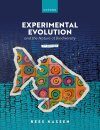![Experimental Evolution and the Nature of Biodiversity Experimental Evolution and the Nature of Biodiversity]()
Click to have a closer look
About this book
Contents
Customer reviews
Biography
Related titles
About this book
Uncovering the principles governing the origin and fate of biodiversity is the central goal of modern biology. The first edition (2014) of this novel textbook drew on more than two decades of research in microbial experimental evolution to provide a sketch of a general, empirically grounded theory of biodiversity and the first synthetic treatment of experimental evolution. It has since become an indispensable resource to research laboratories around the world as an essential introduction to the field.
However, the science has moved on considerably over the last decade and an updated and expanded treatment of the subject is now timely. Three developments bearing directly on the issue of the nature of biodiversity now deserve particular attention and inclusion: (1) The introduction of high-throughput tools to capture the detailed dynamics of genetic variation are revealing that adaptation is a far more complex process than previously anticipated; (2) A rapidly expanding literature on adaptation and diversification in the kinds of physically complex, multispecies assemblages thought to characterize natural communities; and (3) A growing literature on the evolution of novelty and innovation that takes advantage of the unique features of microbial evolution experiments to study both the ecology and genetics of this process. In this second edition the author updates existing analyses with more recent work, expands on existing chapters to include the most important new ideas, and incorporates three new chapters (parallel and convergent evolution; the evolution of novelty and innovation; coevolution), detailing their respective contributions to our improved understanding of adaptation and diversification.
Experimental Evolution and the Nature of Biodiversity is an accessible, upper level textbook aimed principally at graduate students and practising researchers interested in the evolution of biodiversity, particularly through the lens of experimental evolution.
Contents
Prefaces
Introduction: The Evolution of Biodiversity
1. An Introduction to Experimental Evolution
Part 1: Adaptation
2. Adaptation to a Single Environment
3. Divergent Selection
4. Variable Environments
5. Genomics of Adaptation
6. Repeated Evolution
7. Novelty and Innovation
Part 2: Diversification
8. Phenotypic Disparity
9. Coevolutionary Diversification
10. Rate and Extent of Diversification
11. Genomics of Diversification
Conclusion
12. The Nature of Biodiversity
Customer Reviews
Biography
Rees Kassen is Full Professor and University Research Chair in Experimental Evolution at the University of Ottawa. He is known internationally for his integrative approach to the study of biodiversity and his pioneering work using microbes to study evolutionary and ecological processes in the laboratory. Rees has also played leading roles at the interface between science, society, and policy, serving currently as Vice-Chair of the Science and Innovation Advisory Council at the Institute on Governance, a board member of the Earth Leadership Program of FutureEarth, and as a public voice for research through media interviews, op-eds and blogs, as well as collaborations with artists and journalists.
































